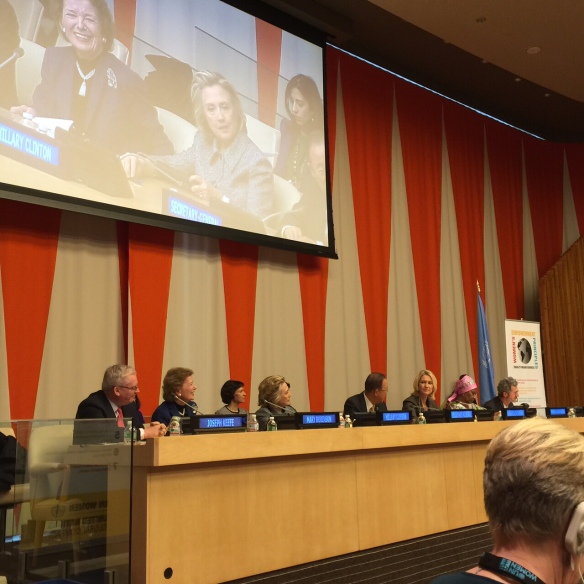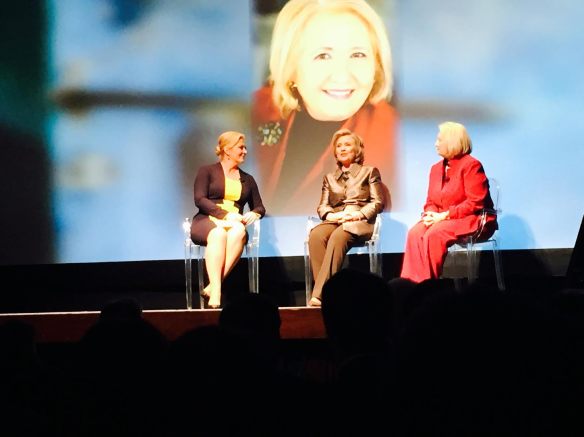By Mara D’Amico, Alexandra Zimmerman Safir and Ashley Binetti
Though the Commission on the Status of Women meets annually, this year was especially significant as it marked the 20th anniversary of the UN Fourth World Conference on Women, where 189 countries adopted the landmark Beijing Platform for Action. This anniversary, along with the 15th anniversary of the passage of UN Security Council Resolution 1325 and the transition from Millennium Development Goals to Sustainable Development Goals, set the stage for critical evaluations of the progress that has been made and thoughtful plans for moving forward.
The week kicked off with International Women’s Day on March 8, and moved into the Clinton Foundation’s release of the No Ceilings Full Participation Report and #NotThere campaign. Through a mass collection and analysis of data on women and girls, the report shows us that more than 150 countries lack critical protections to ensuring women’s economic participation. We see that one in three women has experienced sexual or physical violence, often at the hands of a husband or partner. And we learn that women are still significantly underrepresented in parliaments and other decision-making bodies across the globe. This data is helping us to acknowledge the progress that has been made, and prove how far we still have to go.
Staff members from GIWPS participated in the opening week of CSW59, attending a series of events from “Realizing Gender Equality, Women’s Rights and Women’s Empowerment within and beyond the Post-2015 Development Agenda” to “The Role of Social Norms for Gender Equality” to “Women’s Economic Empowerment: Regional and Global Policy Challenges.”
Throughout the week’s events, a few key themes emerged.
Women’s Participation In Decision-Making
Across the events, subject-matter experts discussed the need for greater participation of women in decision-making at all levels. In order to advance and sustain the gains that have been made with regard to women’s health, girls’ education, women’s economic participation and involvement in peacekeeping, it is essential that women have a place at decision-making tables.
As noted by Gloria Bonder, Principal of the Gender, Society and Policy Department at FLACSO, “We’ve made many advances for women’s presence in society, and we need to make sure we talk about where we include women…We need to work to bring a future of inclusion with quality at the same time.”
Women’s participation in decision-making cannot be an afterthought, and it should be a priority in the boardroom, at the parliamentary level, in electoral processes and in families. Especially in conflict and post-conflict situations, women must be included in the decisions that deeply impact their lives and the future of their country. According to one speaker, “It’s more dangerous to be a woman than a soldier in armed conflict…Women are also not consulted on their needs, which affects the quality of their assistance.” Having a place at the table can not only save their lives, but can also chart a new course for a more sustainable future.
In one session on advancing women’s political participation, Massimo Tommasoli of International IDEA noted that the Sustainable Development Goals had made “great improvements” by making “women’s full and effective participation and equal opportunities for leadership at all levels of decision-making in political, economic and public life” a target. However, women MPs currently represent 22% of parliamentarians, and 73% of countries have 15% or fewer women in parliament. One panelist from Kenya noted that campaign financing is one of the greatest barriers prohibiting women from entering politics, as well as threat of violence and pervasive cultural attitudes. A female parliamentarian from Kenya shared, “If I had to go through what I went through again to get elected, I would probably not run; It was so hard.”
A Focus On Women And Climate Change
As we move from the Millennium Development Goals to the Sustainable Development goals and really task ourselves with thinking sustainably, we must make it a priority to include women and girls in discussions and decisions. The impacts of climate change and natural disasters disproportionately impact women and girls, and any measures to respond to climate change should include their voices. This was a common thread throughout a number of discussions on fully realizing the Beijing Platform for Action and prioritizing gender equality in the post-2015 Sustainable Development Goals. One panelist echoed this sentiment in stating, “This is a key year for change. We can’t achieve any of these goals unless women and girls are front and center.”
The Role Of Men And Boys In Achieving Gender Equality
In every event that we attended, there was, at the very least, some mention of the role of men and boys in achieving gender equality. There seemed to be an overwhelming acceptance that what have long been called “women’s issues” are the concern of all, and gains in gender equality both requires and benefits those of every gender. As noted by Bafana Khumalo, Senior Programmes Specialist at Sonke Gender Justice, “Gender equality is not just about policies. It’s about life, and quality of life. There’s no other option but to include men and boys because it does benefit all.”
Despite this widespread acceptance of the inclusion of men and boys in addressing the most intractable issues facing women and girls, many speakers discussed the challenges we still face in actually implementing this charge. Hazami Barmada, co-Founder of Al-Mubadarah, echoed this sentiment in stating, “The fight for equality is not about programs and initiatives. It will require a movement, a paradigm shift. There are socio-economic and cultural issues that need to be addressed.”
Programs like the UN Women’s HeForShe campaign can start to shift these entrenched gender norms, but it is critical that we seek new and innovative ways to include men and boys in this work of shifting the thought paradigm about gender equality.
Ties Between Women And Economic Growth
While it has been recognized that more women are entering leadership positions and running large companies, women’s participation in the labor force has actually stagnated. Globally, women still face significant challenges in access to paid work, the majority of their work in the informal sector goes unrecognized, and women across every region often deal with a care burden or achieving a so-called work-life balance. However, each region also has its own unique challenges in regards to women’s economic participation, and must tailor unique policies to overcome these challenges.
During one panel event, the representative from the African region discussed women’s significant participation in small-scale mining; however, much of this participation is not counted and, therefore, is rarely captured in GDP earnings. The work they do is invisible to policy-makers and the public, but legislation for mine safety and policies to benefit women in the small-scale mining industry could have a tremendous impact in ensuring a safe working environment and that women’s participation is measured appropriately.
If we were to close the global labor force participation gender gap, global GDP could grow by 12%. Women’s economic empowerment is essential to poverty alleviation and eventual elimination, and must be an integral part of the post-2015 Sustainable Development Goals.
The Need For More Data
Beginning the week with the No Ceilings Full Participation Report launch set the stage for essential discussions about the need for more data on women and girls. According to Shailaja Chandra, Chief Secretary in Delhi, “You need these tools to be able to convince governments – data, statistics, etc. Only when you have that is it possible to make policy decisions and investments.” Organizations have now spent decades planning and implementing programs to advance the status of women and girls, and thorough evaluations of these programs are necessary to determine the ways in which we move forward. We need data to see why we have made such progress globally in some areas, but still have deep-seated gender gaps in other areas.
Coming away from CSW59, the energy emanating from the almost 9,000 activists who attended is tangible. However, the outcomes of the two-week convenings are less momentous. Many women’s organizations consider the resulting political declaration to be weak, and accuse the body of backtracking on efforts to fully realize or move beyond the Beijing Platform for action.
We must build on the existing momentum to advance women’s rights and well-being across the globe, but we need to do this in a more forward-thinking way. Though it is important that we reflect critically on the progress that has been made and the goals that have not yet been achieved, we have to set a higher standard for women’s rights around the world. The Beijing Platform for Action was incredibly progressive and forward-thinking when it was adopted in 1995, and we can fully honor its significance by raising the bar now in 2015.
Mara D’Amico is the 2014-2015 Hillary Rodham Clinton Communications Fellow at the Georgetown Institute for Women, Peace and Security. She is a graduate of the Clinton School of Public Service, specializing in policy and programming to address gender-based violence.
Ashley Binetti is the 2014-2015 Hillary Rodham Clinton Law Fellow at the Georgetown Institute for Women, Peace and Security. She received her J.D. from Georgetown University Law Center in 2014, specializing in human rights and transnational law.
Alexandra Z. Safir is the Program Coordinator for the International Council on Women’s Business Leadership at the Georgetown Institute for Women, Peace and Security. She holds a Master’s Degree in Middle Eastern Studies from the University of Chicago.







 “Bringing one half of humanity in support of the other half of humanity for the benefit of all.”
“Bringing one half of humanity in support of the other half of humanity for the benefit of all.” You can learn more about HeForShe and take the first step by pledging your commitment to support gender equality here:
You can learn more about HeForShe and take the first step by pledging your commitment to support gender equality here: